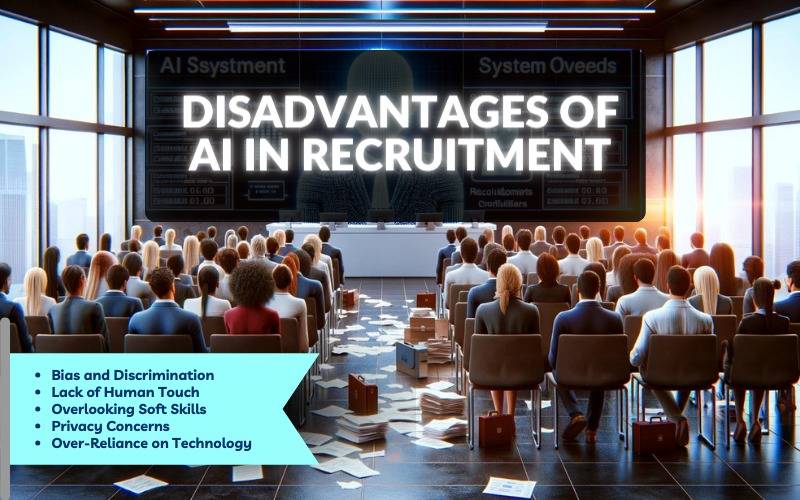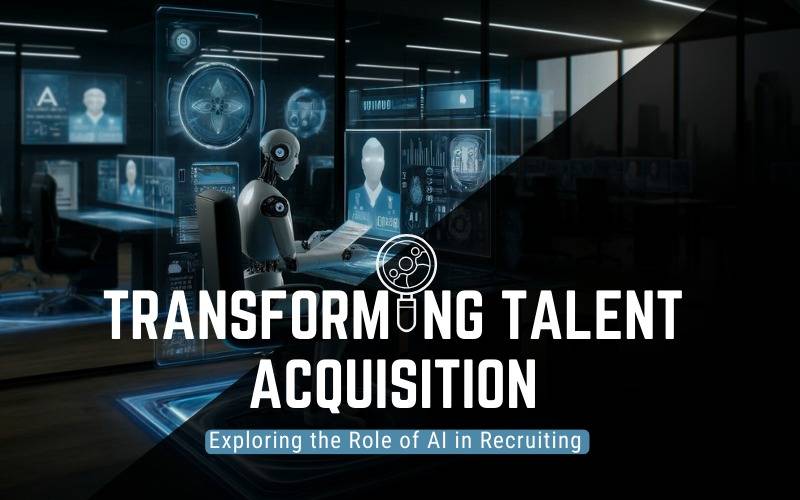Exploring the Role of AI in Recruitment: Transforming Talent Acquisition
What if we used smart robots to help us find the perfect team members? How do you think that would change the way we hire people? Artificial Intelligence (AI) is transforming the hiring process, making it quicker and more streamlined. Traditionally, it takes about 42 days to fill a position, but AI can significantly speed this up by quickly analyzing resumes and applications to identify top candidates.
This helps avoid the lengthy and complex processes that deter 60% of job seekers from completing their applications. Moreover, with the rise of video interviews by 67% since the pandemic, AI aids in scheduling and conducting initial screenings, enhancing efficiency and convenience for both employers and candidates. Overall, AI is becoming an essential tool in modern recruitment, saving time and improving outcomes.In this blog, we’ll explore how AI can streamline and enhance our recruiting processes.
How HR teams are using AI?
HR teams are using AI to handle many everyday tasks, helping them work faster and more effectively. AI tools can quickly go through heaps of resumes to find candidates with the right skills and experience, showcasing the efficiency of AI in Recruitment. These tools also help with interview scheduling, saving time by organizing meetings automatically. When applicants have common questions, like where to find information about the company or the next steps after applying, AI chatbots can answer them right away. This means that HR staff can spend more time on meaningful conversations with candidates and current employees instead of repetitive tasks.

The Impact of AI on HR
AI is changing how HR departments operate by improving efficiency and helping teams make better decisions. Here are a few key areas where AI is making a significant impact:
Employee Training and Development: AI identifies skill gaps within teams and recommends personalized training programs to help employees improve in their roles or prepare for career growth. This ensures that training is relevant and helps in enhancing productivity.
Workforce Analytics: By analyzing attendance records, performance data, and employee feedback, AI helps HR departments predict trends like employee turnover. This proactive approach allows HR teams to implement strategies to increase job satisfaction and retain talent.
Diversity and Inclusion: AI can track diversity metrics and identify unconscious biases in recruitment, performance evaluations, and promotions. This data-driven approach ensures fair treatment and equal opportunities for all employees.
Administrative Efficiency: Automating tasks like payroll processing, benefits administration, and compliance reporting reduces manual errors and saves valuable time for HR teams, letting them focus more on strategic initiatives.
Top AI Tools That HR Can Use
Resume Screening Software: Tools like HireVue and Pymetrics automated resume screening, identifying candidates whose qualifications best match the job requirements.
Chatbots: Tools such as Mya and Olivia handle applicant inquiries and streamline communication throughout the hiring process.
Predictive Analytics: Software like Visier and Workday analyzes workforce data to predict employee turnover and identify future talent needs.
Sentiment Analysis: Tools like Qualtrics and Peakon Assess employee morale and engagement by analyzing survey feedback and communication trends.
Performance Management Systems: Platforms such as Lattice and Reflektive provide data-driven performance reviews, helping to set personalized growth plans.
Learning Management Systems: Tools like Cornerstone and Docebo recommend personalized training programs based on identified skill gaps.

Disadvantages of AI in Recruitment
While AI can streamline recruitment, it has its drawbacks:
Bias and Discrimination: If the AI is trained on biased data, it can unintentionally favor or exclude certain groups based on gender, race, or other characteristics. This can lead to discriminatory hiring practices.
Lack of Human Touch: Relying heavily on AI for initial screenings and communication can make the process feel impersonal, potentially leaving candidates feeling undervalued.
Overlooking Soft Skills: AI might focus too much on technical qualifications, missing out on important attributes like creativity, teamwork, or adaptability that are harder to quantify.
Privacy Concerns: The use of AI in recruitment often involves the collection and analysis of personal data. If not handled carefully, it can raise concerns around data security and privacy.
Over-Reliance on Technology: Relying Entirely on AI tools may cause recruiters to miss out on valuable insights that come from human Insight and understanding during the hiring process.

3 Ways to Keep the Hiring Process Human While Using AI Strategies
Incorporate Personal Touchpoints: Balance automated resume screening and interview scheduling with personalized communication. Send candidates thoughtful follow-up emails or provide human-led video introductions to make them feel valued and connected throughout the hiring process.
Blend AI Insights with Human Intuition: Use AI tools to identify candidates who meet key criteria, then involve hiring managers in evaluating soft skills, cultural fit, and motivation. This combination ensures that candidates are assessed fairly without overlooking important human qualities.
Offer Transparent Feedback: After using AI for initial assessments, provide clear feedback to candidates about their application status. Let them know how their skills align with the role or why they were not selected, giving them a positive experience and a sense of respect.
How will AI shape HR in the future?
AI in Recruitment will transform the future of HR by automating resume screening, enabling recruiters to quickly identify top candidates and reduce biases. Personalized onboarding and training plans will help new hires adapt swiftly and grow in their roles. Predictive analytics will forecast workforce needs and spot employees at risk of leaving, supporting proactive talent management and retention strategies. By handling repetitive tasks and providing valuable insights into employee satisfaction, AI in Recruitment will empower HR teams to focus on strategic initiatives that align talent management with business goals.
Conclusion
AI is redefining both administrative HR tasks and employee management. By automating repetitive processes like resume screening, payroll, and benefits administration, HR teams can focus more on strategic initiatives and improve the efficiency of their daily operations. In employee management, AI-driven insights help predict workforce trends, identify skill gaps, and offer customized onboarding and training programs that foster growth and satisfaction.
In summary, AI enables HR professionals to better align their practices with business objectives by improving recruitment, enhancing employee engagement, and providing data-driven solutions. The key takeaway is that adopting AI in Recruitment leads to smarter talent management, higher productivity, and a more positive workplace culture.
Frequently Asked Question
How to Create Smarter and More Fair Recruitment Processes?
To create smarter and fairer recruitment processes, use AI to analyze hiring data and minimize unconscious bias by anonymizing personal details. Balance automated screening with human oversight to evaluate soft skills and cultural fit. Regularly review recruitment outcomes to refine the process for inclusivity and relevance.
What role do chatbots play in HR processes?
Chatbots manage repetitive tasks like answering candidate questions, scheduling interviews, and providing updates, freeing HR teams to focus on strategic decision-making.
Can AI tools help reduce bias in hiring?
Yes, some AI tools anonymize applicant information and use objective criteria to screen candidates, helping minimize unconscious biases and ensure fair hiring practices.
How do AI-driven performance management systems benefit employee development?
Performance management systems analyze employee data to create personalized growth plans, ensuring that training and career progression align with both employee goals and business needs.
What is predictive analytics, and how does it help HR teams?
Predictive analytics leverages data trends to anticipate workforce needs, such as identifying potential turnover risks and forecasting future hiring requirements, helping HR strategize effectively.
How do sentiment analysis tools enhance employee engagement?
Sentiment analysis tools interpret employee feedback and communication patterns to gauge morale and identify concerns, allowing HR teams to address issues promptly and foster a positive workplace culture.


